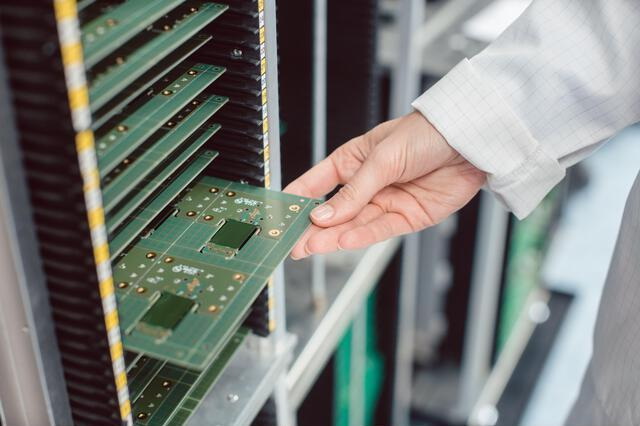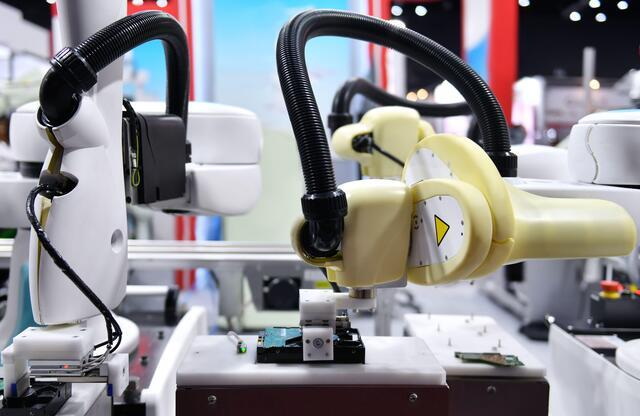Content Menu
● Introduction to SMT Stencils
>> Key Functions of SMT Stencils
● SMT Stencil Laser Cutting Technology
>> Advantages of Laser Cutting
>> Features of SMT Stencil Laser Cutting Machines
● Enhancements in PCB Soldering Quality
>> Superior Solder Paste Release
>> Enhanced Precision and Alignment
>> Material Innovations
● Challenges in Laser-Cut SMT Stencil Production
● Future Trends in SMT Stencil Technology
>> Nano-Coatings and Surface Treatments
>> Additive Manufacturing Integration
>> Automated Inspection Systems
>> AI-Driven Optimization
● Conclusion
● FAQ
>> 1. What makes laser-cut SMT stencils superior to chemically etched ones?
>> 2. How do conical apertures improve solder paste application?
>> 3. What materials are commonly used for laser-cut SMT stencils?
>> 4. Are there cost considerations when using laser-cut SMT stencils?
>> 5. How does AI impact future stencil design?
● Citations:
The production of printed circuit boards (PCBs) is a cornerstone of modern electronics manufacturing. Surface mount technology (SMT) plays a critical role in this process, with SMT stencils serving as essential tools for applying solder paste to PCB pads. The quality of these stencils directly impacts solder joint reliability, making their precision and design vital. Among the methods used to manufacture SMT stencils, laser cutting has become the industry standard due to its unparalleled accuracy and efficiency. This article explores how SMT stencil laser cutting enhances PCB soldering quality and why it is indispensable for modern electronics.

Introduction to SMT Stencils
SMT stencils are thin sheets, usually made of stainless steel, with apertures that match the solder pads on a PCB. These apertures allow solder paste to be deposited accurately during the assembly process. The stencil ensures precise application of solder paste, which is critical for forming reliable connections between components and the PCB.
Key Functions of SMT Stencils
1. Accurate Solder Paste Application: Stencils ensure the correct amount of solder paste is applied to each pad, preventing issues like insufficient or excessive solder.
2. Component Alignment: By guiding component placement, stencils help ensure proper alignment during assembly.
3. Defect Reduction: High-quality stencils minimize common defects such as solder bridges or voids, improving assembly yield.
SMT Stencil Laser Cutting Technology
Laser cutting technology has transformed the production of SMT stencils by offering unmatched precision and efficiency. This process uses high-powered lasers to cut apertures into stencil materials with extreme accuracy.
Advantages of Laser Cutting
- High Precision: Laser cutting achieves tolerances as tight as ±5 μm, which is essential for high-density PCBs with miniature components[1][7].
- Smooth Aperture Walls: The process creates smooth internal walls with geometric changes less than 3 μm, ensuring superior solder paste release characteristics[1][7].
- Conical Apertures: Slightly tapered openings improve paste release and reduce residue, enhancing print quality[5][6].
- Material Versatility: Laser cutting works with various materials and thicknesses, including fine-grain stainless steel designed for improved performance[3][7].
Features of SMT Stencil Laser Cutting Machines
Modern laser cutting machines such as LPKF StencilLaser systems offer advanced features tailored for stencil production:
1. High-Speed Cutting: Machines can produce up to 20,000 apertures per hour, enabling rapid production cycles[5].
2. Real-Time Process Control: Advanced systems monitor cutting parameters dynamically to maintain consistent quality[6].
3. Automatic Frame Adjustment: Reduces setup time and enhances production efficiency[6].

Enhancements in PCB Soldering Quality
Laser-cut SMT stencils significantly improve PCB soldering quality by addressing key challenges in the assembly process.
Superior Solder Paste Release
1. Smooth Aperture Walls: The smooth edges created by laser cutting reduce paste adhesion, ensuring cleaner prints and fewer defects[1][7].
2. Conical Apertures: Tapered openings facilitate better paste release, minimizing residue and improving deposition accuracy[5][6].
Enhanced Precision and Alignment
1. High Accuracy: Laser-cut stencils align perfectly with PCB pads, reducing misalignment issues that can lead to defective solder joints[7].
2. Ultra-Fine Pitch Capability: These stencils accommodate patterns below 250 μm, essential for modern electronics with miniature components[1][7].
Material Innovations
1. Fine-Grain Stainless Steel: This material offers smaller surface grains for smoother aperture walls and better paste release characteristics[1][3].
2. Nano-Coatings: Advanced coatings reduce adhesion and prolong stencil life while improving print quality[4].
Challenges in Laser-Cut SMT Stencil Production
Despite its advantages, laser-cut stencil production faces certain challenges:
1. Higher Costs: Laser-cut stencils are more expensive than chemically etched alternatives due to their advanced manufacturing process[3].
2. Material Limitations: Certain materials or ultra-small apertures may require specialized techniques or equipment[6].
Future Trends in SMT Stencil Technology
The evolution of SMT stencil technology continues to drive innovation in electronics manufacturing:
Nano-Coatings and Surface Treatments
Nano-coatings enhance solder paste release while reducing adhesion and cleaning frequency. These advancements improve fine-pitch printing and extend stencil life[4].
Additive Manufacturing Integration
3D printing enables custom-designed stencils with intricate geometries tailored to specific PCB layouts. This flexibility supports unique component configurations and complex designs[4].
Automated Inspection Systems
Emerging technologies integrate real-time inspection systems into stencil printing processes, detecting defects like insufficient paste volume or misalignment during production[4].
AI-Driven Optimization
Artificial intelligence (AI) algorithms could optimize stencil designs based on historical performance data and specific PCB requirements, further enhancing precision and efficiency[7].
Conclusion
SMT stencil laser cutting has revolutionized PCB assembly by providing unmatched precision, efficiency, and reliability in solder paste application. Laser-cut stencils are particularly beneficial for high-density PCBs with fine-pitch components where accuracy is critical. As technology advances, innovations like nano-coatings, additive manufacturing, and AI-driven optimization promise even greater enhancements in stencil performance.
Laser-cut SMT stencils are not only solving current challenges but also paving the way for future advancements in electronics manufacturing. Their ability to support miniaturization and complex designs ensures their continued relevance in industries ranging from consumer electronics to aerospace.

FAQ
1. What makes laser-cut SMT stencils superior to chemically etched ones?
Laser-cut stencils offer higher precision (±5 μm), smoother aperture walls for better paste release, faster production times, and cleaner manufacturing processes without harsh chemicals[7].
2. How do conical apertures improve solder paste application?
Conical apertures created by laser cutting enhance solder paste release by reducing adhesion to stencil walls, ensuring cleaner prints and fewer defects during assembly[5][6].
3. What materials are commonly used for laser-cut SMT stencils?
Fine-grain stainless steel is widely used due to its smooth surface structure and superior paste release characteristics. Nano-coated materials are also gaining popularity for enhanced performance[1][4].
4. Are there cost considerations when using laser-cut SMT stencils?
While laser-cut stencils are more expensive than chemically etched alternatives, their precision and reliability often justify the investment for high-density or complex PCB assemblies[3].
5. How does AI impact future stencil design?
AI can optimize stencil designs based on historical data and specific requirements, enhancing precision while reducing defects during PCB assembly processes[7].
Citations:
[1] https://www.soldertools.net/smt-stencil/
[2] https://dplaser.com/the-ultimate-guide-to-laser-cutting-pcb/
[3] https://app.lpkfusa.com/articles/stencil/Conquering%20SMT%20Stencil%20Challenges%202009-03.pdf
[4] https://jlcpcb.com/blog/guide-to-smt-stencils-in-pcb-assembly
[5] https://stencillaser.lpkf.com/en/applications/smd-stencil
[6] https://stencillaser.lpkf.com/en/technology/about-stencil-manufacturing
[7] https://www.gssmt-parts.com/how-laser-cut-smt-stencils-revolutionize-pcb-assembly.html
[8] https://www.pcb-hero.com/blogs/nancys-column/advantages-and-disadvantages-of-pcb-smt-stencil-processing-methods
[9] https://www.pcbway.com/blog/PCB_Assembly/The_Main_Factors_Affect_the_Quality_of_SMT_Soldering_and_Its_Solutions.html
[10] https://www.youtube.com/watch?v=Toaz0Hi3miY
[11] https://www.latechlaser.com/news/future-trends-in-smt-stencil-laser-cutting-tec-78495992.html
[12] https://www.twistedtraces.com/blog/understanding-smt-stencils-the-backbone-of-electronics-manufacturing
[13] https://www.ipc.org/system/files/technical_resource/E41&S06_01%20-%20Ahne%20Oostefhof.pdf
[14] https://pcbpit.com/smt-stencil-a-comprehensive-guide/
[15] https://blueringstencils.com/top-5-smt-industry-trends-for-2019/
[16] https://stencillaser.lpkf.com/en/technology/benefits-laser-cutting-stencil
[17] https://www.ipc.org/system/files/technical_resource/E39&S06_03%20-%20Ahne%20Oosterhof.pdf
[18] https://www.stentech.com/company/cvd-treatment-for-smt-stencils
[19] https://www.linkedin.com/pulse/smt-stencils-market-innovations-addressing-key-challenges-kzrcc/
[20] https://www.hanslaserus.com/knowledge/advantages-and-considerations-of-laser-depaneling-for-pcb-boards/




















